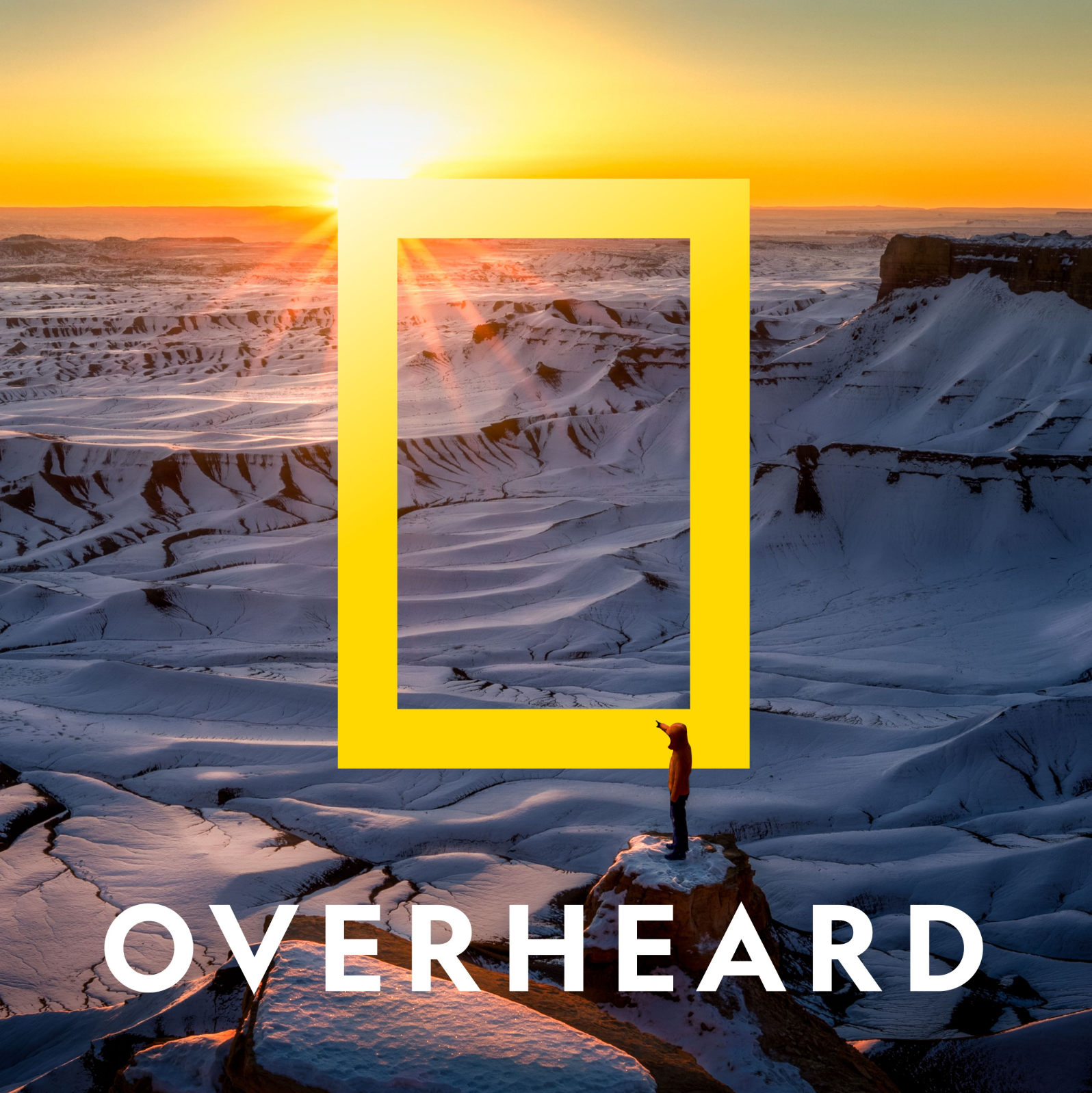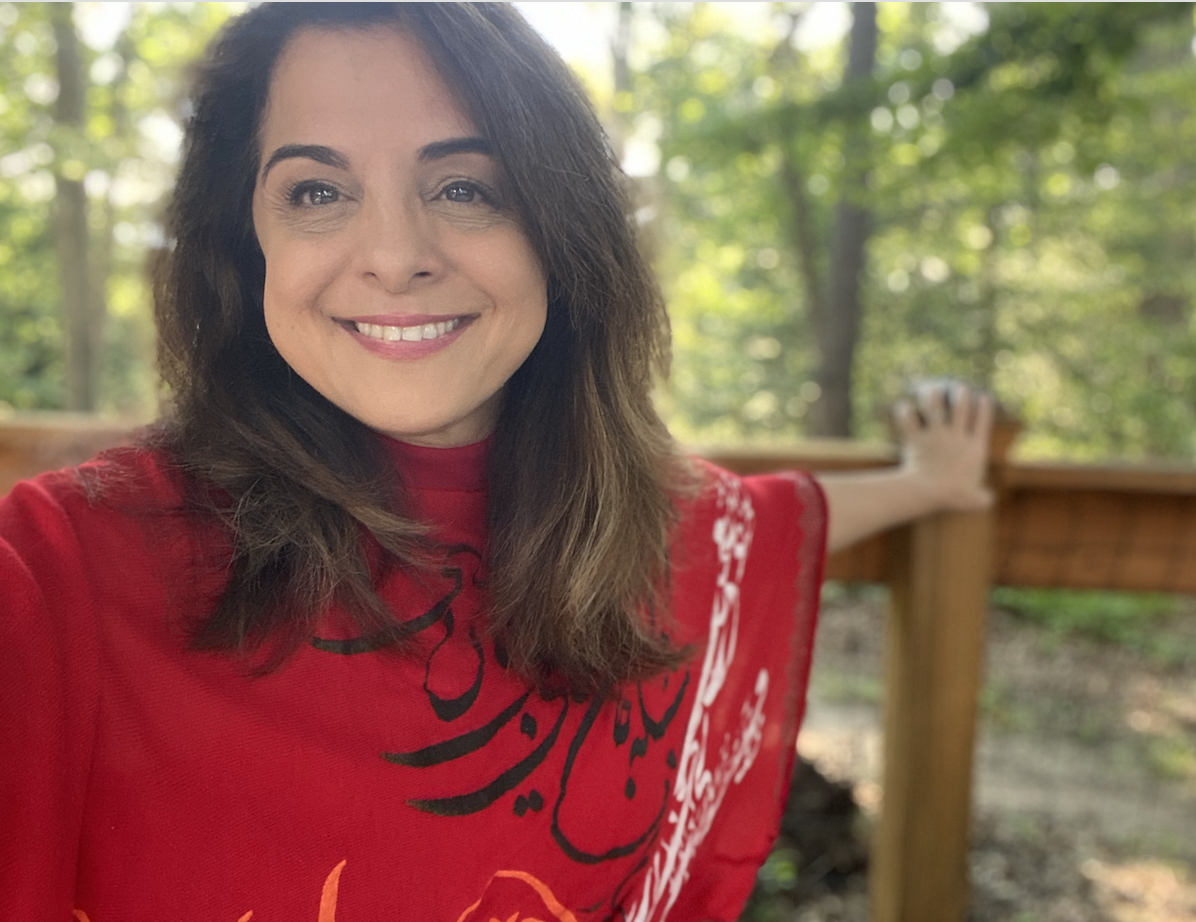
The fourth season of National Geographic’s award-winning podcast series, “Overheard at National Geographic,” airing October 27, will continue to give listeners the opportunity to eavesdrop on the fascinating conversations at National Geographic. Every episode will offer listeners the chance to get swept up in their own curiosity and to enter a world of wondrous happenings — remarkable, surprising and utterly amazing.
Davar Ardalan has joined National Geographic’s as season four’s new executive producer of audio. Davar is a author, journalist, and tech entrepreneur and founder of IVOW AI, which is focused on artificial intelligence and storytelling. Prior to this, she was deputy director of the Presidential Innovation Fellowship Program in Washington D.C. and before that a veteran journalist at NPR News.
For some insight into Davar’s fascinating brain, check out her exclusive Q&A with National Geographic below.
We’ve been working collaboratively across all National Geographic content platforms to make listening not just as a new offering but a companion to subscribing, reading, watching, and following. What we do in the audio division very much mirrors our larger commitment to increasing our impact and expanding the reach of our stories to new audiences.
Davar Ardalan

Season four of ‘Overheard’ covers topics ranging from chronicling democracy, to tornados, to a traveling circus. Tell us more about what will be featured this season?
Davar: We begin the season with a deep and thoughtful conversation with National Geographic Storytelling Fellow and Photographer Ruddy Roye. Ruddy grew up in Jamaica, a cradle of reggae and social justice movements. He tells Overheard’s Peter Gwin how his background prepared him to cover the historic protests and civil unrest in America in 2020. He also talks about what he’s tackling in his National Geographic project “When Living Is a Protest,” and what he tells his sons about growing up in America. I hope you all listen in on October 27th.
On November 3, we’ll hear from Andrea Bruce, a National Geographic photographer who has covered conflict zones around the world for nearly two decades. She tells Overheard’s Amy Briggs how her experiences covering events in Egypt, Afghanistan, and Iraq now shapes the way she’s chronicling democracy in America in 2020.
And yes, on the traveling circus, we feature the dramatic tale of one of Central America’s oldest-running circuses stranded abroad during the pandemic. Photographer and National Geographic Explorer Tomas Ayuso encountered the Segovia Brothers Circus stuck in Honduras amid the coronavirus lockdown. Together with Peter Gwin and Podcast Producer Laura Sim, we chronicle the performers’ rollercoaster journey back to their native Guatemala–and the surprising circus fan who came to the rescue.
In one of our final episodes, Amy Briggs dons a mask and ventures into our National Geographic photo studio with Podcast Producer Brian Gutierrez to see a new color—the first blue pigment of its kind to be discovered since Thomas Jefferson was president. This “new blue” will appear on the pages of National Geographic in our December issue.
What is the most interesting thing you’ve learned so far while producing ‘Overheard?’
I love the camaraderie of our podcast team. Despite the virtual nature of our work right now, we’ve been incredibly collaborative and supportive of one another. We have a curious and hardworking team who are not only crafty in the art of narrative storytelling but also in awe of the work of that National Geographic explorers, photographers, and scientists uncover around the world. Together, we are committed to bringing their work to audio as we expand this domain strategically together with our leadership at National Geographic.
How will season four of ‘Overheard’ be different from previous seasons?
We’ve been working collaboratively across all National Geographic content platforms to make listening not just as a new offering but a companion to subscribing, reading, watching, and following. What we do in the audio division very much mirrors our larger commitment to increasing our impact and expanding the reach of our stories to new audiences.
In Season 4, you’ll hear National Geographic Channel’s Mariana van Zeller describe her investigation into tiger trafficking and how unethical wildlife tour operators encourages a cycle of breeding and mistreatment. As part of the podcast episode, our own Peter Gwin and our Senior Editor, Eli Chen, dig deeper into why ownership of big cats remains loosely regulated in many states. Looking ahead to Season 5, Peter Gwin and Podcast Producer Brian Gutierrez, in collaboration with the magazine, will be taking listeners on a trip into New Mexico’s Gila Wilderness, which was the first designated wilderness area in the United States.
Who would your dream podcast guest be on ‘Overheard?’
Any scientist, explorer, or other person out there doing fascinating work or making ground-breaking discoveries and will surprise and delight our listeners. I’d love for us to interview Dr. Gloria Washington. She’s an amazing computer scientist and doing pioneering work at Howard University. She runs the Affective Biometrics Lab (ABL) and together with her students focuses on human-centered computing and biometrics in the context of improving the lives of underrepresented people. For instance, performing computer vision techniques on textured hair or identifying individuals based solely from pictures of their ears rather than facial recognition. Her explorations aim to improve interactions between humans and computers. I’d love for us to visit her lab and talk to her students.
What are the advantages of audio storytelling?
Personally, I’ve always learned more through sound than images. Can I actually say that at National Geographic? But it’s true, some of us are wired more to respond to stories told through sound. One of my favorite memories as a child was sailing on the Nile river with my family. The sounds of the river and the stories I heard from Egyptians during that trip left a deep impression on me. I carried all those sounds in my head for years. Then in 2008, I was in Egypt on assignment for NPR and I was able to take listeners on a trip down the river and weave in some of those sounds I remembered in a story about how climate change was affecting this crucial and historic waterway.
Now audio storytelling and podcasting are on the rise. That’s because as a medium audio is very intimate but also flexible. The audience can listen but also be doing other things–like driving to work or doing chores, etc. You do all those things but be lost in the story, a completely other world.
How do you see the future of automation and storytelling?
As communications becomes more hyper-personalized, journalists stand to benefit from advancements in artificial intelligence (AI) that enable us to better understand our audiences, and drastically improve our engagement especially with diverse audiences. Over the past few years, the AI community has been mining vast amounts of data and leveraging algorithms foster innovation in self-driving cars, cybersecurity, and healthcare applications. Journalists need to learn how to apply this same science for future AI consumer storytelling applications — it’s an untapped market.
How did your passion for automation develop?
Meaningful automated stories of the future will only come about if we diversify available data and metadata now.
As the daughter of a scholar and an architect, I spent many summer days on cultural excursions with my family to the Parthenon in Greece, the Pyramids in Egypt, and the Persepolis in Iran. In my career as a journalist at NPR News for over two decades, I designed stories anchored in multiculturalism. In 2015, my last position at NPR News was senior producer of the Identity and Culture Unit. Looking ahead, I see a gaping hole in the emerging tools that will train future storytellers — the lack of prolific cultural content in artificial intelligence algorithms.
It was in the summer of 2017 when I got hooked to AI. I followed as IBM Watson applied AI tools to covering the matches at Wimbledon. Working with the All England Lawn Tennis Club, IBM Watson analyzed and curated the best moments from the matches, producing “cognitive highlight” videos and sharing the content with global fans. The speed, scale, and accuracy of the machine-curated content was mind-boggling and only possible because for 22 years Watson has been analyzing an estimated 53+ million tennis data points.
All around us, technology is creating new and dynamic ways to share content. Journalists need to embrace this technology. In the context of global storytelling, automation does not need to be synonymous with the loss of ancient wisdom and cultural knowledge. With Cultural Intelligence, AI can help, rather than hinder, humans in our quest to share our unique stories especially those of under-represented people, cultures, and perspectives, including great women in history and the ancient traditions they represent.
What are some of the things you’re researching the most right now?
Together with Amy Briggs and National Geographic History magazine, we are delving into modern discoveries that show that ancient Amazons were no myth. As part of a 2021 episode, we will meet the real women warriors who rode horses, rocked tattoos, and scared the pants off the ancient Greeks.
And, together with Podcast Producer Jacob Pinter, we are researching a story about how to prevent the spread of a deadly virus. As part of this episode we will be speaking with National Geographic Explorer Pardis Sabeti, a scientist fighting Ebola and Covid-19 as she teams up with a high school teacher to find better answers — so stay tuned for that!
It’s an incredibly exciting time to be leading the audio podcast division at National Geographic and to collaboratively help forge this 132-year-old organization into new frontiers.
“Overheard at National Geographic” is currently available on Apple Podcasts, Spotify, Stitcher, iHeartRadio, Google Podcasts, and Castbox. For more information on the podcast visit www.natgeo.com/podcasts/overheard/.